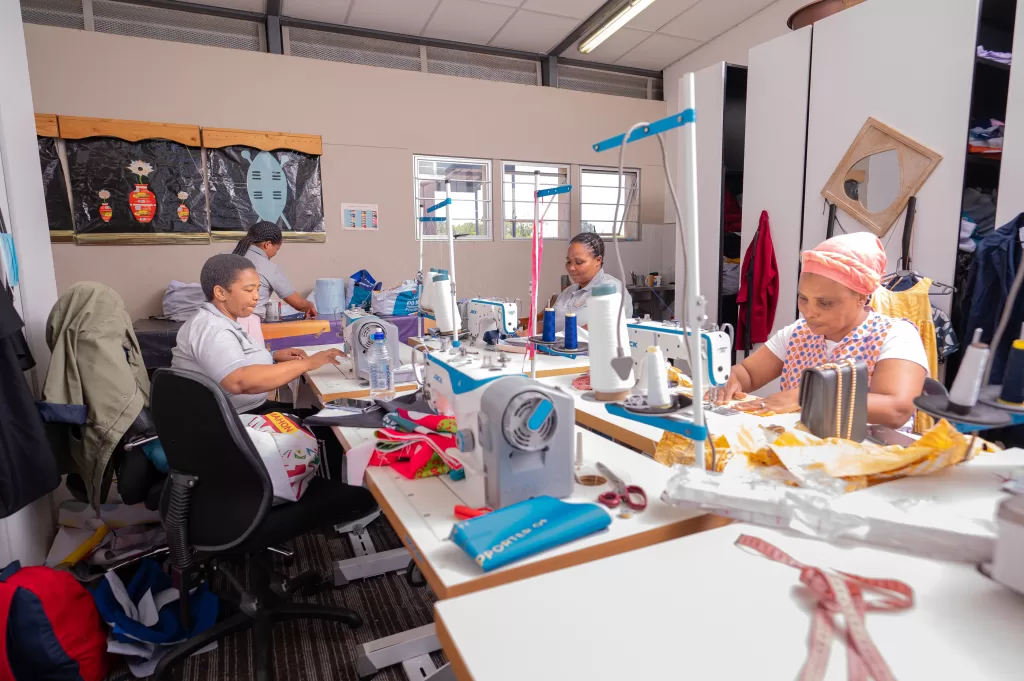In collaboration with Niya Consulting, the DO MORE FOUNDATION (founded by RCL FOODS) launched the Township Economy Programme in 2019 to empower young women in rural South African communities as sustainable business owners. The initiative aims to equip these women—often the primary breadwinners in their families—with practical skills and business acumen, helping them navigate challenges like poverty, social obstacles, poor infrastructure, and limited resources. Implementing this programme in Hammarsdale (KZN) and Rustenburg (NW) has provided significant insights and posed challenges, offering valuable lessons for businesses and non-profits seeking to replicate such initiatives.
- Overcoming Language and Educational Barriers in Training
One of the early lessons learned was the need to understand the demographics and educational backgrounds of the communities involved. Initially, the training in Hammarsdale was too theoretical, causing disengagement. In response, the materials were adapted to focus on practical, hands-on learning, with simplified business concepts like basic accounting and sales recording to make them accessible to women with different levels of education. Language barriers were also addressed by incorporating the local language into explanations and using bilingual trainers who provided culturally relevant examples, making the training more relatable and effective.
- Addressing Social and Economic Realities
The programme’s evolution was shaped by the challenging realities faced by participants, where immediate needs often took precedence over long-term benefits. Initially, a high dropout rate was observed due to candidates’ inability to afford travel costs. Introducing a travel allowance significantly improved attendance, highlighting the need to address economic barriers. Additionally, recognizing that candidates faced toxic stress, poverty, and heavy family responsibilities, the programme expanded to include modules on self-confidence, personal development, and women’s empowerment. This holistic approach aims to equip participants with both business skills and the emotional resilience and social support necessary to succeed.
A practical example of the resilience these women demonstrate is illustrated by one candidate, Thandaza Mazibuko from Thandaza M Enterprise, who shared her experience of running a takeaway business next to a local tavern. Despite the safety risks of working late at night, she recognises that catering to the tavern’s patrons benefits her business. This story highlights how these women overcome social challenges daily to ensure their businesses succeed.
- Moving from Survival to Strategy
A key challenge has been shifting candidates’ mindsets from survival to strategic business thinking. Many women started their businesses out of necessity in environments with limited social and economic infrastructure. To address this, one-on-one mentoring was introduced during the six-month incubation phase, providing practical support to help candidates apply their learning in real-world contexts and implement sustainable practices.
Flexibility in content and delivery was also essential, with the programme evolving based on candidates’ needs and community feedback. For instance, adding an emotional intelligence module helped women present themselves more professionally, enabling them to negotiate deals with larger retailers and partners. This adaptability has been crucial to the programme’s success.
- Humility in Development: Do Not Assume You Know It All
A key realization in community development is that the true experts are the community members themselves, as they have a deep understanding of their environment. It’s essential to approach the community as partners rather than beneficiaries. Instead of imposing external solutions, successful development work involves listening to the community’s needs and collaborating on solutions. This approach respects the community’s knowledge and leads to more effective and sustainable outcomes.
- The Power of Collaboration: You Cannot Do It Alone
A core element of the Township Economy Programme is its collective impact model, which thrives on collaboration among a diverse group of stakeholders, including funders like Pepkor Speciality, Buckman Laboratories, Polyco, and Use It, as well as strategic partners, local trainers, community leaders, and the participants themselves. This approach prioritizes partnership over ownership, acknowledging that development is a complex, non-linear process that demands open and honest communication about challenges. The involvement of ward councillors has been particularly crucial, as their deep understanding and strong connections within their communities enable us to address both visible and underlying local issues, ensuring the programme’s effectiveness.
“The resilience of these women is remarkable, but our success hinges on strong partner collaboration. Their support is vital in providing the resources and training needed to turn this resilience into lasting success.” – Iris Naidoo, Partnership Manager at The DO MORE FOUNDATION

- The Ripple Effect, Ubuntu, and ‘Paying It Forward’
Another key element of the Township Economy Programme has been using success stories from previous participants to inspire new candidates. Stories like Ntombizethu Sithole, who progressed to running a corporate canteen, served as powerful examples of what could be achieved. These first-hand accounts reinforced the belief that success was attainable for all participants. Additionally, the programme emphasized the spirit of Ubuntu, encouraging participants to “pay it forward” by reinvesting their skills and resources back into their communities. This included passing on skills like sewing, woodworking, and gardening, as well as reinvesting profits, such as the 5% from the Clothes 4 Purpose programme, to support future candidates. These community-building efforts have reinforced the programme’s sustainability and long-term impact.

Conclusion: Empowering Female Entrepreneurs to Build Resilient Communities
Through the Township Economy Programme, this collective impact partnership has developed a powerful approach to empowering female entrepreneurs in South Africa’s township economies. By understanding the local context, maintaining flexibility, and fostering strong collaborations, they have equipped women with the skills to run sustainable businesses and contributed to building resilient communities. Empowering these women extends beyond economic development, providing them with the tools, support, and confidence to overcome challenges and transform their lives and communities. Their strategies offer a blueprint for creating lasting impact in similar contexts, helping more women rise above adversity and drive meaningful change.


























